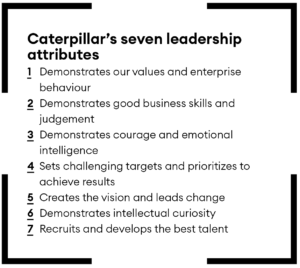A great team dynamic was critical when Caterpillar and Duke CE decided to pivot to virtual leadership development in the face of Covid-19
In early 2020, the range of opinions on the use of virtual programmes in corporate education was wide and varied. For some, shifting portions of the development curriculum to virtual platforms was a multi-year project, aimed at curbing costs and reaching convenience goals. For others, the possibilities of such a shift were still in the exploration stages, with debates to be had about quality and impact. But in March 2020, the timelines for moving to virtual delivery collapsed for almost every learning and development executive, as the Covid-19 pandemic forced all but the most necessary business activities into the digital world. This was the situation that we in the Caterpillar and Duke Corporate Education (Duke CE) teams found ourselves facing: just four days before the scheduled launch of our Senior Leadership Program, LD400, we were forced to pull the plug.
How we adapted to the sudden change of circumstances and pivoted to deliver the programme online speaks volumes about the importance of teamwork to successfully pivoting to virtual delivery of leadership development – and to the potential impact of virtual and hybrid programmes through 2021 and beyond.
A strategy for profitable growth
LD400 was designed to bolster Caterpillar’s enterprise strategy for sustained profitable growth by targeting 25 influential leaders, seeding the behaviours necessary to create alignment across the company’s culture and to successfully drive change. The programme recognized that one of the most important factors in implementing real change is showing up with consistency: with that in mind, the 2020 programme was expected to build on the successful small-scale programme we ran in 2018-2019. It would become an integral part of Caterpillar’s leadership development and help senior leaders prepare for and reframe the future.
As we began to plan the 2020 programme, we identified opportunities for aligning more closely with Caterpillar’s newly defined strategy – so in late 2019, we came together to review and redesign our programme content. We worked to double down on the consistency of our message and increase our impact, taking Caterpillar’s newly defined seven leadership attributes (see box, below) and weaving them in throughout the programme. We discovered multiple opportunities to further explore the complexities of the global business – an emphasis which would prove to be highly valuable during the actual programme delivery, when we were able to share real-time pandemic challenges as case studies.

Crucially, this was a shared design process. That provided a clear focus for both teams and allowed us to dive deeply into the Caterpillar culture. It was critical to building a unified solution to engage and align the talent in the organization – and it was also an opportunity to build a relationship between the Caterpillar and Duke CE teams that would prove valuable in the months that followed.
The pandemic hits
In March 2020, the launch of LD400 was imminent. Across the Caterpillar and Duke CE teams, we shared high expectations for the programme and its success. Then, as the days to launch ticked down, the world began to feel like the setting of a Michael Crichton novel. As Chris Arvin, manager of executive leadership development at Caterpillar, recalls: “It was late on a Friday night, and the entire world was shutting down.” That day, the White House declared coronavirus a national emergency. Long conversations unfurled among our teams over the weekend about the planned launch of LD400, scheduled just four days later, as we built up towards bringing participants together in Chicago at the end of the month.
The information we were receiving was mixed at best. Would this be a two-week shutdown or something longer-lasting? Inputs came not only from news reports but from the company’s regions around the globe. With programme participants located both domestically in the US and internationally, we were able to gather insights from their experiences as their communities, cities and countries shut down.
Caterpillar culture is steeped in safety and it became clear that the best, safest, choice was a near-term postponement of the programme. But Caterpillar also places real emphasis on the development of ambidextrous thinking – the ability of leaders to focus on competing priorities. In relation to the company strategy of profitable growth, this often means focusing on short-term pressures and long-term goals simultaneously: in the context of LD400, agile leadership meant determining not just how to survive, but how to thrive. As it became obvious that we could not simply pause before moving forward with the existing plans, the decision was made not only to push the programme back, but to redesign it for virtual rollout.
Delivery would now happen under the new constraints of a global pandemic, but we would ensure that this cohort of leaders could continue their growth and leverage the development opportunity.
Thriving, not just surviving
Having made the decision to move to virtual programming, our biggest challenge was determining our options for delivery. If you had asked us in the moment what was most important to the success of the programme, our answer would probably have been the technological capability to deliver a programme that could meet or exceed the learning needs of the most senior leaders of a Fortune 100 company. In retrospect, however, it was the foundation of a strong team relationship, powered by trust and respect, which allowed us to flex our plans and deliver a solution that exceeded expectations.
Tactically, one of the challenges was adapting to different levels of detail in the virtual environment. We had to adjust our previous expectations of control, and trust that we could manage the ambiguity of an online delivery environment. Preparation was important: we had the virtual deliveries scheduled down to the minute. In retrospect, we might now admit that was a bit overzealous – but it proved fundamental to our ability to engage from the sidelines during the programme delivery.
We learned that the fundamentals of evaluating a programme and gauging participant engagement truly don’t change, even though the tools we were using had changed. In many ways, those new tools allowed us to be even more nimble. We watched participants’ reactions closely and were able to react to their engagement in real time, with discussions happening among the entire programme team over chat apps about how we could tighten delivery, strengthen messaging and adapt – whether for the next day, or even for the next session on the same day. Short after-action reviews (ARRs) after every session became a helpful routine. These gave us time to react to what was happening in the ‘classroom’ and adjust as needed. That level of iteration made a real difference to the programme and it is a lasting lesson: whether we are delivering programmes fully virtually or through a hybrid model, adapting in real time is enormously advantageous to virtual programming.
For example, one of our educators used a paper flipboard during his presentation. It worked surprisingly well and showed us that we could meld ‘old school’ and ‘new school’ technologies as needed. We also found that having executives engage in back-and-forth, organic dialogue – without use of slides – was highly impactful. Perhaps most importantly, iterating on the deliverables as the programme was running allowed us to react fluidly to the real-life challenges of life in quarantine. We may have been focused on gauging reactions to the content and observing how the shorter segments of programming were working, but we were also able to react quickly to the human aspects that were happening in peoples’ home – like dogs barking or children popping up next to a parent.
That boldness and willingness to iterate in real time was bolstered by the system of support that exists at Caterpillar. The chief executive Jim Umpleby volunteered to open the programme with a Q&A session, diving into the new terrain with us and speaking about leadership in a moment when leaders were scrambling to use every lever at their disposal to guide the business through a once-in-a-lifetime event. The insights shared by the senior leadership team were incredibly valuable (and their trust and willingness to participate fully in our first completely virtual delivery of development programming also helped build and sustain our confidence as a team).
One of the questions Umpleby was asked was whether Caterpillar might leverage its capabilities to assist in supporting healthcare: we were watching New York City build field hospitals as the East and West Coasts of the US went into full lockdowns in response to what we came to know as the Spring surge of Covid-19 cases. The question gave Umpleby a chance to take a deep dive into Caterpillar’s strategy and seven leadership attributes, and he walked us through the considerations surrounding that issue. He discussed the importance of Caterpillar focusing on the solutions that Caterpillar is best at providing, such as power systems to run healthcare centres and newly-constructed field hospitals.
Teamwork fundamentals
Futurists will tell you that they have long predicted a move to virtual learning – that the pandemic simply collapsed the timeline to full-scale adoption. They also envision the integration of artificial intelligence, holograms and virtual reality into leadership development. Moving from in-person to virtual programming was simply one pivot within the continual evolution of learning and development and, as the world keeps changing, those pivots will continue to be required. The pace will only grow faster.
Amid all this change, we can find comfort in a constant focus on the fundamentals of teamwork. With those in our arsenal, every unknown pivot becomes a challenge in which we can prevail, and everything that we set out to build provides a chance to strengthen the foundations of our teams.

